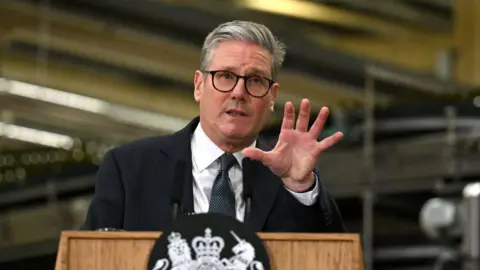Chris Mason: Why it was always likely Sue Gray would go

 PA Media
PA MediaWhen I was leaked Sue Gray’s salary last month, details of her pay were less important than what the leak revealed about the anger of those alongside her in government.
In short, they were flipping angry – angry about her perceived power, her abilities, and they accused her of failing to sort out the pay of other special advisers, as they are known.
Others, I should point out, felt it all amounted to a personal vendetta and was grossly unfair.
But, fair or otherwise, the anger was very real.
It presented Sir Keir Starmer with few options: get rid of her, get rid of those unhappy with her, or solve the underlying problems.
Solving the underlying problems looked difficult without either of the other two options happening too.
And getting rid of all of those unhappy with her would have been difficult too – firstly, there were quite a few of them, and secondly finding them would not have been easy, as they had been making their feelings known discreetly.
So did Sue Gray jump or was she pushed?
I am told – by sources that have been consistently reliable through all of this – that a decision was made on Friday and the prime minister was willing to sack Sue Gray.
He had decided, whatever she said, that she could no longer be his chief of staff.
In the end they were able to find a mutually convenient role into which she could be demoted.
And make no mistake, it is a massive demotion, into a part-time job that didn’t previously exist.
As it happens, there is a Council of the Nations and Regions happening on Friday at which the first ministers of Scotland and Wales, the first and deputy first ministers of Northern Ireland, and mayors from around England will gather.
The prime minister will be there and so, I’m told, we should expect Sue Gray to be too.
But after that we shouldn’t expect to see Sue Gray and the prime minister together very often – her time in Downing Street is now over.
In truth, many in government had felt privately for some time her position was increasingly untenable – and will hope her ousting and the wider rejig will sharpen the government’s sense of purpose and cut the number of own goals.
A party that was ruthlessly well prepared for the election has looked rather less prepared for the realities of government.
The promotion of Morgan McSweeney as Ms Gray’s replacement and the arrival of James Lyons, a former political journalist turned communications director in both the public and private sector, are likely to give the operation a sharper political edge.
 Getty Images
Getty ImagesTellingly, one element of the rejig is the government’s list of planned announcements, known internally as “the grid”, that had been under the command of Ms Gray.
It will now be under the control of the No10 communications team, where some believe it should always have been.
“Look at that news grid, week after week after week of stories about freebies,” one senior figure said to me the other day with an exasperated tone.
They were articulating a double frustration – a frustration at the initial failure of judgement in accepting the donations and how they were spent, and a frustration at how long it had taken the party to deal with the row.
Other Labour figures, though, are privately jittery that all this “looks like the leakers have won”, as one put it to me.
Labour made much of saying they would offer an alternative to the chaos of recent Conservative administrations.
And yet within weeks there was backbiting and infighting.
The prime minister will hope this marks the end of it.










